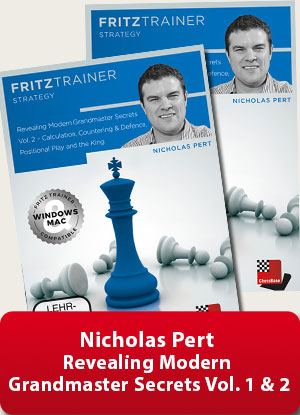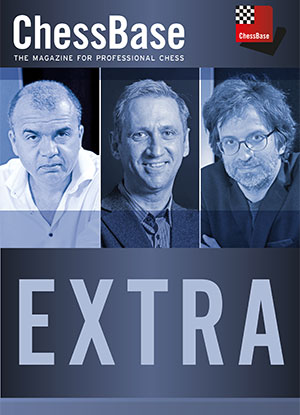CHESSBOOK REVIEWS

Latest book
reviews of 1 November 2024
Wilhelminalaan 33
7261 BP RUURLO
The Netherlands.
John
Elburg
Chess DVD's

Revealing Modern
Grandmaster Secrets Vol. 1 & 2
by Nicholas Pert
http://www.chessbase.com
E-Mail
info@chessbase.com
2024
Price Euro 69.90
Windows 7 or higher
Minimum: Dual Core, 2 GB RAM, DirectX11, graphics card with 256 MB RAM,
DVD-ROM drive, Windows Media Player 9, ChessBase 14/Fritz 16 or
included Reader and internet access for program activation.
Recommended: PC Intel i5 (Quadcore), 4 GB RAM, Windows 10, DirectX11,
graphics card with 512 MB RAM or more, 100% DirectX10-compatible sound
card, Windows Media Player 11, DVD-ROM drive and internet access for
program activation.
MacOSX only available as download! Minimum: MacOS "Yosemite"
10.10
Invest 12 hours of your time and step into the world of chess mastery
with this impressive course, from the great Nicholas Pert “Revealing
Modern Grandmaster Secrets.” And dig into the strategies, insights, and
techniques of modern grandmaster play.
Learn the strategic foundations and advanced ideas,A powerful strategy
is to avoid the most common replies and instead use offbeat variations
to limit your opponent’s knowledge.
By mastering this technique, you’ll confidently outmanoeuvre your
opponents early on and set the stage for a winning game. Master the
techniques of Attacking the King, seize the Initiative
Take control of the game with proactive, dynamic play. Learn the
secrets of maintaining and exploiting the initiative.
In the second part you will find: Modern Grandmaster Secrets Vol. 2 –
Calculation, Countering & Defence, Positional Play and the King.
Elevate Your Calculation Skills Sharpen your mind with advanced
calculation techniques. Learn to visualise the board like a grandmaster
and make decisions with confidence and accuracy.
Perfect Your Positional Play!
All with interactive training including video feedback
Extra: Training with ChessBase apps – Play key positions against Fritz
on various levels
Conclusion The perfect companion to
mastership!

ChessBase
Magazine issue 221
Extra
October 2024
ChessBase
http://www.chessbase.com
E-Mail
info@chessbase.com
ISSN 1432-8992
Euro 14,90
System requirements:
Minimum: Pentium III 1 GHz, 1 GB RAM, Windows Vista, XP
(Service Pack 3), DirectX9 graphic card with 256 MB RAM, DVD-ROM drive,
Windows Media Player 9, ChessBase 12/Fritz 13 or included Reader and
internet connection for program activation. Recommended: PC Intel Core
i7, 2.8 GHz, 4 GB RAM, Windows 8.1 or Windows 10, DirectX10 graphic
card (or compatible) with 512 MB RAM or better, 10
This issue starts with smashing opening videos from Ivan Sokolov
1.e4 e5 2.Nf3 Nc6 3.Bb5 a6 4.Ba4 Nge7 5.c3 f6!? and Fabien Libiszewski
1.e4 c5 2.Nf3 Nc6 3.d4 cxd4 4.Nxd4 e5 5.Nb5 d6 6.N1c3 a6 7.Na3 Be6
8.Nc4 Rb8.
The main file is good for 53896 entries but all without
comments,for the analysed games please see the excellent lucky bag file
with 45 detailed analyses.
A fine example of this all the following win from Max Warmerdam,
Max Warmerdam (2636) - Rapport,Richard (2752) [A40]
Bundesliga 2324 Germany (15.8), 28.04.2024
[Krasenkow,Michal]
1.d4 e6 2.c4 c5 3.d5 g6 4.e4 d6 5.Bd3 Bg7 6.h3 It is hardly necessary
to prevent ...Bc8-g4 in advance. [After 6.Nf3 exd5 7.cxd5 Bg4?! 8.Qa4+
Nd7 (8...Bd7 9.Qb3) 9.Nfd2! Black's g4 bishop gets into trouble.; 6.Nc3
is possible, too.] 6...exd5 7.exd5 A solid option. [7.cxd5 Ne7 8.Nf3
0-0 9.0-0 a6 10.a4 f5 11.Nc3 Nd7 leads to a well-known position, in
which Black gets counterplay, e.g. 12.exf5 Nxf5 13.Ng5 Ne5 14.Be4 Nd4
15.f4 Nf7 16.Nxh7!? Kxh7 17.Qh5+ Kg8 18.Bxg6 Nh6 19.g4 Ndf5 20.gxf5
Bxf5÷ Lazarev,V (2500)-Chatalbashev,B (2520)/San Benedetto op
1999 (6)/1-0] 7...Nd7 8.Nf3 Qe7+ White tries to avoid "normal"
positions after [8...Ngf6 9.0-0 0-0 10.Nc3 , which are quite grim for
him.] 9.Qe2 White gladly trades queens against this aggressive
opponent. [9.Be2 could be met with 9...f5!? , e.g. 10.0-0 Ngf6 11.Re1
0-0 12.Nc3 Ne4 13.Nxe4 fxe4 14.Bd3 Rxf3! 15.gxf3 Ne5 with big
complications.] 9...Qxe2+ [9...Ne5?! 10.0-0 Nxd3 11.Qxd3 Bf5 12.Qb3]
10.Kxe2 Ne5 11.Nxe5 Bxe5 12.Nc3² White's space advantage
guarantees him a small edge in any case. 12...Bd7 13.Bd2 f5 14.f4 Bd4
[14...Bg7 was quieter.] 15.Kf3 Nf6 16.Ne2!? White accepts the
challenge. Black's d4 bishop is trapped. 16...Ne4!? [16...Bxb2 17.Rab1
Ba3 18.Rxb7± a5 19.Bxa5] 17.Be1 [17.Nxd4 Nxd2+ 18.Ke3 Nxc4+
(18...Ne4!?) 19.Bxc4 cxd4+ 20.Kxd4 Kf7 - Black should not lose here.]
17...Bg7 [17...Bxb2 18.Rb1 Bf6 19.Rxb7 Bc8 20.Rb3 Kf7 21.g4²]
18.Bxe4 fxe4+ 19.Ke3! White's king takes a dominating position in the
centre. 19...Bxb2 [19...0-0 20.Bc3! is quite pleasant for White. Black
goes for a position with opposite-coloured bishops, which is, however,
unfavorable for him, too.] 20.Rb1 Bd4+?! [20...Bf6 21.Rxb7 Bc8 22.Rb3
0-0 (<22...Ba6 23.Bc3!) 23.Bc3 Bh4!? 24.g3 Bd8 was probably a better
option: Black kept a bishop pair, which could become active in future.]
21.Nxd4 cxd4+ 22.Kxd4 0-0-0 23.Bb4 Kc7?! [¹23...Ba4] 24.Rhe1?! Not
willing to take a risk, White misses an excellent opportunity:
[24.Bxd6+! Kxd6 25.Rxb7 Rhf8 (25...Ke7 26.Re1 Kf6 27.Rxe4± is
quite unpleasant for Black so he should rather give the bishop back
hoping to survive in the rook ending) 26.c5+ Ke7 27.c6 Rxf4 28.Rxa7 Rf2
29.Rb1! Kd6 (29...Rd2+ 30.Kxe4 Kd6 31.Rxd7+ Rxd7 32.cxd7 Kxd7 33.Rb7+
Kd6 34.Rxh7 Rxg2 35.a4 Ra2 (35...Re2+ 36.Kd4 Rd2+ 37.Kc4) 36.Ra7 Re2+
37.Kd4 Rd2+ 38.Kc4 Rc2+ 39.Kb3±) 30.Rxd7+ Rxd7 31.cxd7 Kxd7
32.a4 Rxg2 (32...Ra2 33.Kxe4 Rxa4+ 34.Ke5) 33.Ra1 with good winning
chances] 24...b6 If Black protects his e4 pawn, then the bishop
sacrifice gains in strength: [24...Rde8 25.Bxd6+! Kxd6 26.Rxb7;
24...Rhe8 25.Bxd6+ Kxd6 26.Rxb7 Ke7 27.Rxe4+ Kf6 28.Rxe8 Bxe8 29.Rxa7 ,
and White should win.] 25.Rxe4 Rde8 26.Rbe1 Rxe4+ 27.Rxe4 Re8
[27...Rf8!?] 28.Rxe8 Bxe8 That's what Black hoped for.
Opposite-coloured bishops, only one pawn down - should be a draw,
right? The problem is, however, his d6 pawn, fixed on a dark square - a
"second weakness", in addition to White's future passed pawn on the
kingside. 29.g4 Bd7 [29...b5 30.c5 dxc5+ 31.Kxc5 Bf7 32.Ba5+ Kd7 is not
something Black would be glad to defend. Still, it is probably drawish.
Here are some possible lines, a thorough analysis is needed to reach
the final conclusion: 33.a3 Bg8 34.Bb4 Bf7 35.Kd4 Bg8 36.Ke5 Bf7 37.d6
(37.f5 gxf5 38.gxf5 Bh5! 39.Kf6 Bf3 40.d6 Be4 41.Kg5 h6+ 42.Kxh6 Bxf5
43.h4 Ke6 44.Kg7 Bg4 45.Kg6 a5 46.Bc5 Bf5+ etc.) 37...Bc4 38.Kf6 (38.f5
gxf5 39.gxf5 Bd3 40.f6 Bg6 41.Kd5 Bf7+ 42.Kc5 a6 43.Kb6 Be8 44.Kxa6
Ke6!=) 38...Bf1 39.h4 Bh3 40.g5 Be6 41.Kg7 Bf5 42.Kxh7 a5 43.Bxa5
(43.Bc5 Kc6) 43...Kxd6 44.Be1 Ke6 45.h5 gxh5+ 46.g6 Bb1 47.Kh6 Kf5
48.Bg3 h4 49.Bh2 Kf6=] 30.Ke4 Ba4 31.Kd3 Bd7 32.Ke4 Ba4 33.Kd3 Bd7
34.Kd4 h5? Wrong! It was better to wait: [34...Bc8] 35.f5! hxg4
[35...gxf5 36.gxh5 Be8 37.h6 Bg6 38.Ke3 Kd7 39.Kf4 Ke7 40.Kg5 Bh7
41.a4? f4 42.Kxf4 Bd3 43.Kg5 Kf7 44.Bxd6 Bxc4 45.Be5 Bd3 46.d6 Ke6
47.d7 Kxd7 48.Kf6+-] 36.f6 Be8 37.hxg4 This position is winning for
White as his king breaks into the kingside. 37...a6 [37...Kd7 38.Ke4
Bf7 39.a4 a6 40.Kf4+-; 37...g5 38.Bd2 Bg6 39.Bxg5 doesn't change much:
White's king later goes to e3-f4-g5.] 38.Ke4 b5 Desperation. 39.cxb5
axb5 40.Kf4 Bf7 41.Kg5 Kd7 42.a3 Ke8 43.Bxd6 Bxd5 44.Kxg6 1-0.
Conclusion: Very important reference
material!

